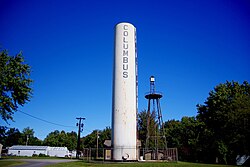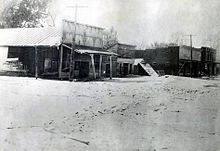Columbus, Kentucky
Columbus, Kentucky | |
|---|---|
 Water tower in Columbus | |
 Location of Columbus in Hickman County, Kentucky. | |
| Coordinates: 36°45′37″N 89°6′10″W / 36.76028°N 89.10278°W | |
| Country | United States |
| State | Kentucky |
| County | Hickman |
| Area | |
• Total | 0.32 sq mi (0.83 km2) |
| • Land | 0.32 sq mi (0.82 km2) |
| • Water | 0.00 sq mi (0.00 km2) |
| Elevation | 459 ft (140 m) |
| Population (2020) | |
• Total | 140 |
| • Density | 440.25/sq mi (169.85/km2) |
| Time zone | UTC-6 (Central (CST)) |
| • Summer (DST) | UTC-5 (CDT) |
| ZIP code | 42032 |
| Area code(s) | 270 & 364 |
| FIPS code | 21-16768 |
| GNIS feature ID | 0489887 |
Columbus is a home rule-class city in Hickman County, Kentucky, in the United States. The population was 140 at the 2020 census, a decline from 229 in 2000. The city lies at the western end of the state, less than a mile from the Mississippi River.
Columbus-Belmont State Park borders the city to the west.
History


Columbus is the oldest town in Kentucky's Jackson Purchase. It was first settled on the Mississippi floodplain in 1804 and known as "Iron Banks" after the site's French name les rivages de fer.[2] The long-held local rumor that President Thomas Jefferson planned to remove the American capital to the site[3][4] has absolutely no basis in fact.[2]
The name of the town was changed to Columbus in 1820 (in honor of the Italian explorer), the year the town received its first post office and was formally established by the state assembly. It was the original Hickman County seat before the transfer of the court to the more central location of Clinton.[2] It was formally incorporated in 1860.[5]
In 1861, after the American Civil War broke out, the town was seized by Confederate forces (including the Louisiana "Shreveport Rebels". They fortified the site overlooking the Mississippi River, building Fort de Russey.[6]) Confederate general Leonidas Polk tried to run and maintain a large anchor chain across the entire Mississippi at Columbus in order to block Union traffic downriver. Columbus was also the northernmost spur on the Mobile and Ohio Railroad. The Union responded by General Ulysses S. Grant's engaging the Confederates at Belmont on the Missouri shore. This was Grant's first direct combat during the war. These actions are today commemorated at the Columbus-Belmont State Park on the bluff near Columbus.
In 1878, the American railroad legend Casey Jones got his first railroad job here, working as a telegrapher for the Mobile and Ohio at the age of 15.
The Great Mississippi Flood of 1927 deluged the town, as well as many areas downriver in the Mississippi Delta, where hundreds of thousands of acres were flooded. Survivors moved the town of Columbus, rebuilding it upon higher ground above the flood plain. Some of the original houses were saved and moved inland.[7]
Given its isolated location in a rural area and the decline in river traffic, the town has lost population for years.
Geography
Columbus is located in northwestern Hickman County at 36°45′37″N 89°6′10″W / 36.76028°N 89.10278°W (36.760176, -89.102840),[8] on high ground 0.6 miles (0.97 km) east of the Mississippi River. It is bordered to the west by Columbus-Belmont State Park, which occupies a bluff rising nearly 200 feet (61 m) above the river.
Kentucky Route 58 leads southeast from Columbus 9 miles (14 km) to Clinton, the county seat. Kentucky Route 123 passes through the center of town, leading south then east 15 miles (24 km) to Clinton and north-northeast 10 miles (16 km) to Bardwell. Via Kentucky Route 80 it is 6 miles (10 km) east-northeast to Arlington.
According to the United States Census Bureau, the city has a total area of 0.3 square miles (0.8 km2), all land.[1]
Demographics
| Census | Pop. | Note | %± |
|---|---|---|---|
| 1830 | 196 | — | |
| 1860 | 963 | — | |
| 1870 | 1,574 | 63.4% | |
| 1880 | 1,338 | −15.0% | |
| 1890 | 873 | −34.8% | |
| 1900 | 1,235 | 41.5% | |
| 1910 | 970 | −21.5% | |
| 1920 | 654 | −32.6% | |
| 1930 | 513 | −21.6% | |
| 1940 | 552 | 7.6% | |
| 1950 | 482 | −12.7% | |
| 1960 | 357 | −25.9% | |
| 1970 | 371 | 3.9% | |
| 1980 | 296 | −20.2% | |
| 1990 | 252 | −14.9% | |
| 2000 | 229 | −9.1% | |
| 2010 | 170 | −25.8% | |
| 2020 | 140 | −17.6% | |
| U.S. Decennial Census[9] | |||
As of the census[10] of 2000, there were 229 people, 95 households, and 60 families residing in the city. The population density was 558.6 inhabitants per square mile (215.7/km2). There were 110 housing units at an average density of 268.3 per square mile (103.6/km2). The racial makeup of the city was 77.29% White, 17.90% Black or African American, 2.18% from other races, and 2.62% from two or more races. Hispanic or Latino of any race were 4.80% of the population.
There were 95 households, out of which 27.4% had children under the age of 18 living with them, 49.5% were married couples living together, 12.6% had a female householder with no husband present, and 35.8% were non-families. 31.6% of all households were made up of individuals, and 12.6% had someone living alone who was 65 years of age or older. The average household size was 2.41 and the average family size was 3.11.
In the city, the population was spread out, with 23.1% under the age of 18, 13.5% from 18 to 24, 26.2% from 25 to 44, 24.0% from 45 to 64, and 13.1% who were 65 years of age or older. The median age was 35 years. For every 100 females, there were 102.7 males. For every 100 females age 18 and over, there were 95.6 males.
The median income for a household in the city was $25,313, and the median income for a family was $29,844. Males had a median income of $21,667 versus $14,500 for females. The per capita income for the city was $11,766. About 5.1% of families and 9.1% of the population were below the poverty line, including 13.5% of those under the age of eighteen and 8.3% of those 65 or over.
Climate
The climate in this area is characterized by hot, humid summers and generally mild to cool winters. According to the Köppen Climate Classification system, Columbus has a humid subtropical climate, abbreviated "Cfa" on climate maps.[11]
References
- ^ a b "2020 U.S. Gazetteer Files". United States Census Bureau. Retrieved March 18, 2022.
- ^ a b c Rennick, Robert M. Kentucky Place Names. The University Press of Kentucky (Lexington), 1988. ISBN 0-8131-0179-4.
- ^ "The History of Columbus, Kentucky Historical Marker". www.hmdb.org. Retrieved January 19, 2022.
- ^ Bailey, Bill (1995). "Columbus-Belmont State Park". Kentucky State Parks. Saginaw, Michigan: Glovebox Guidebooks of America. ISBN 1-881139-13-1.
- ^ Commonwealth of Kentucky. Office of the Secretary of State. Land Office. "Columbus Archived 2013-07-14 at archive.today". Accessed 14 July 2013.
- ^ John D. Winters, The Civil War in Louisiana, Baton Rouge: Louisiana State University Press, 1963, ISBN 0-8071-0834-0, p. 42
- ^ "The History of Columbus, Kentucky". The Historical Marker Database. Retrieved August 17, 2012.
- ^ "US Gazetteer files: 2010, 2000, and 1990". United States Census Bureau. February 12, 2011. Retrieved April 23, 2011.
- ^ "Census of Population and Housing". Census.gov. Retrieved June 4, 2015.
- ^ "U.S. Census website". United States Census Bureau. Retrieved January 31, 2008.
- ^ "Columbus, Kentucky Köppen Climate Classification (Weatherbase)". Weatherbase.
External links
 Media related to Columbus, Kentucky at Wikimedia Commons
Media related to Columbus, Kentucky at Wikimedia Commons

